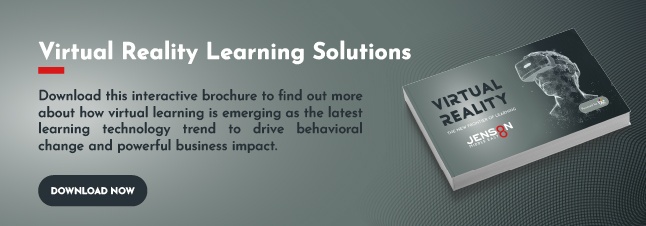Blog Post by Hazel Jackson
A leader's ability to manage the unknown and leading through uncertainty has been pressure tested in the last 15 months. Just when some countries thought they had conquered the change, others got thrown into turmoil. Satya Nadella, CEO of Microsoft, describes that leaders should shift from a "know it all" mindset to a "learn it all" one. We have to build leaders who can be comfortable with not knowing the answers and collaborating with their teams to figure things out in this crazy new world.
How to Leverage Virtual Reality For Leading Through Uncertainty
In a recent Harvard Business Review Article, 6 strategies for Leading through Uncertainty, authors, Rebecca Zucker and Darin Rowell provided some context on how we can help navigate the new world of work. As I read this clear and powerful article, I realized it mirrored the simulations created by Jenson8 in a virtual reality immersive experience.
Here I've brought these two bodies of work together for when leading through uncertainty.
1. Embrace the Discomfort of Not Knowing.
Leaders have often built their careers on having the right answers. Being comfortable with not knowing seems to be counter-intuitive. I've watched numerous leaders tentatively don a VR headset in our Dubai Virtual Reality Lab. Apart from a safety briefing, they and their teams are told very little about the challenges they have to undergo in VR simulation. Some react with genuine curiosity, while the lack of instructions nearly paralyzes others.
2. Distinguish Between Complicated and Complex.
Zucker and Rowell differentiated Complex challenges from Complicated challenges. The latter (complicated) are usually the things that you can take a systematic approach to, break down the problem and take a step by step approach for resolution. Complex challenges are much harder, with an ever-moving set of interdependent elements. The VR Simulation, which takes place over a one day offsite or onsite experience, is complex.
3. Let Go of Perfectionism.
I've seen this play out in our VR simulations – the desire to get things right the first time clouds a leader's ability to explore, be curious and really learn from failure. Even when teams have planned to go into the simulation and fail fast, to learn fast, once they are immersed into the situation, ego takes over, and they can't help themselves but strive for perfectionism. This provides an incredible learning insight during facilitation.
4. Resist Oversimplifications and Quick Conclusions.
The Jenson8 Apollo VR Simulation throws leaders into an environment that is completely outside their comfort zone. In the HBR article, the authors talked about high achieving leaders' bias for action, and the frustration it causes when it doesn't all fall into place quickly. We see this in minutes in the VR environment as leaders battle to fully understand the complexity of the problem. It's a live environment that shows the need to balance their need for action with a disciplined approach to learn more about the problem.
5. Don't Do It Alone
The research shows that as problems get more complex, leaders' natural tendency is to double their efforts to solve the issues individually. Complexity should instead trigger a response of reaching out for more involvement. This is where we need to collaborate and seek different perspectives and thinking. The immersive multiplayer set-up of the VR simulation replicates the natural tendency to want to figure things out individually. However, success is only possible if teams work together.
6. Zoom Out
When we get stuck with complex problems, often we can't see the wood for the trees. Being able to step out of a given situation and view it from a different perspective is key. The authors referenced moving from "the dance floor to the balcony" – written about in The Practice of Adaptive Leadership, by Heifetz, Linksy and Grashow. We get to literally recreate this in a virtual world, where your authentic reactions come out in minutes and are heightened and current. Then we get to debrief immediately and explore how this leadership behaviour might show up in the workplace—literally transporting you from the dance floor to the balcony. This is often uncomfortable but can be extremely powerful.
If I didn't know better, I'd think Jena Davidson, founder of Jenson8, Rebecca Zucker, founder of Next-Step Partners and Darin Rowell, senior advisor and executive coach – collaborated to build the perfect safe virtual reality simulation that exposes a leader’s behaviour in uncertainty.
At Biz Group, we have partnered with Jenson8, creators of the VR experience, exclusively in the Middle East, to deliver highly realistic Virtual Reality Solutions for preparing leaders to deal with high-pressure situations. Using VR, we recreate crisis conditions to highlight, test and develop effective crisis management behaviours. Participants can safely experiment and practise crisis communications, planning and decision making whilst gaining a better understanding of what and how they behave in the face of uncertainty.
Feel free to get in touch with us to understand how you can leverage the power of Virtual Reality for building leaders who can navigate through uncertain and unpredictable circumstances with ease.







